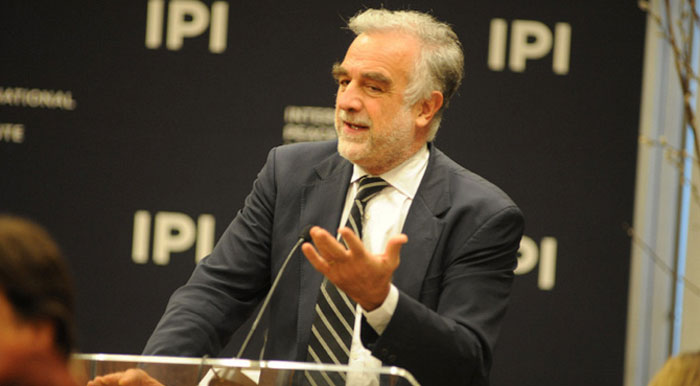
“The real issue is consensus,” Luis Moreno-Ocampo, outgoing chief prosecutor of the International Criminal Court (ICC), told an IPI audience on May 17th. He was speaking about challenges the ICC will face in the next decade.
“Consensus that this person should be arrested is an issue to be decided probably in New York. That is why, to me, this dialogue is very important,” he said referring to the discussion.
Mr. Ocampo, who steps down next month after serving as chief prosecutor since 2003, said that as the ICC now takes up more cases, it also means there are more people challenging the court. These challenges made consensus on implementing court decisions even more important.
“We have consensus on the principle, but there is not yet consensus acquired for implementation,” he said. “For me, arrest is not just a police or military operation. Arrest, first, requires a group who’s here [New York] to reach an agreement that this should be done.” This means that, “when the Court issues a warrant, end of the game. The person should be arrested.”
Citing the example of Sudan, he said that due to a lack of political consensus on pursuing indicted leaders, similar crimes to Darfur are now being committed in South Kordofan, by the same leadership.
Also speaking at the event were Zenon Mukongo Ngay, Minister Counselor at the Permanent Mission of the Democratic Republic of the Congo to the UN, and John Prendergast, Co-Founder of the Enough Project.
Mr. Ngay spoke of the role of cooperation in helping the ICC and states parties carry out its mission. He spoke of the experience of the DRC in this respect, saying that many challenges still remain. “It is clearly established by now that the issue of cooperation with the ICC has been very challenging,” he said.
Mr. Prendergast spoke of outstanding ICC arrest warrants, saying that “the key variable is political will,” to get suspects apprehended.
On the impact of ICC arrest warrants, he said that in the case of Joseph Kony, it “forced Sudan to if not stop its aid…massively reduce it,” to the LRA. It also coalesced international efforts, greatly eroded the strength of the LRA, and gave an international legal framework for the efforts to end the LRA across four borders, he said.
Referring to Bosco Ntaganda, the man wanted by the ICC for conscripting children in armed conflict, Mr. Prendergast said the recent conviction of Thomas Lubanga had helped in the “shattering of the deadly status quo that had developed in Congo. It has exposed this parallel power structure that had developed underneath Bosco in the east.” He continued that it “exposed smuggling networks into Rwanda, Uganda, that these people [the CNDP] were enriching themselves with at expense of people and government.”
“You need to deal with the interests,” of states he said, including crafting strategies that increase the political will of countries that can undertake apprehension strategies.
Speaking about the unprecedented attention gained by Invisible Children’s Kony 2012 campaign, he said, “The politicians take away, there is an interest by the people in the United States and around the world that such a person should not be allowed to act with impunity. That is the main political takeaway that I have had from this extraordinary thing that happened over the last two months.”
The event was moderated by Abdullah Alsaidi, IPI Senior Adviser.
Interview with John Prendergast, Co-Founder, Enough Project
Watch event:







